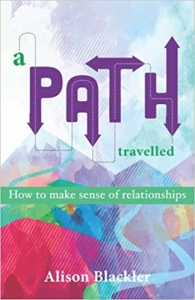Guest Post by Alison Blackler
 And probably one of our biggest challenges. Most adults spend much of their life in an intimate relationship. Relationships are potentially satisfying. They protect us from loneliness and can improve our mental and emotional wellbeing. However, they can be challenging, and many different issues can cause couples disturbances. There are obviously arguments, fights and power struggles, but there are also stress-related reactions to each other, leading to further problems.
And probably one of our biggest challenges. Most adults spend much of their life in an intimate relationship. Relationships are potentially satisfying. They protect us from loneliness and can improve our mental and emotional wellbeing. However, they can be challenging, and many different issues can cause couples disturbances. There are obviously arguments, fights and power struggles, but there are also stress-related reactions to each other, leading to further problems.
Challenges can build up in a relationship over a period of time, increase in frequency or create difficult consequences. The job is to work out what is acceptable and what is not. Each person’s relationship is unique, just like the people in them. Couples can experience turbulent phases, which can lead to much needed changes, or the relationship may become too difficult to continue. Relationships can feel stressful, and our aim is to consider the wider perspective.
Keep in mind that any behaviour can happen with a varying degree of discomfort, and it is for each couple to decide what is acceptable. For some, it can look like a relationship is easy and natural, although there is usually work and commitment aplenty. When relationships work well, there is give and take, respect, honesty and positive regard. With the right balance of compromise and flexibility, it is vital to allow each person to flourish within the relationship. This all sounds so idealistic, and the reality of life and, indeed, relationships, make this an interesting journey. Life is full of experiences, some of which work well and some not so much.
 Many of challenges can be useful to help us grow and develop. If everything were plain sailing, our personal journey would probably be limited. While we clearly need some time of stability, we learn the most from challenging situations. The trick is to see these as a chance to change rather than as a negative experience. Relationships take work and commitment, though focusing on yourself first is critical. This understanding gives peace and clarity.
Many of challenges can be useful to help us grow and develop. If everything were plain sailing, our personal journey would probably be limited. While we clearly need some time of stability, we learn the most from challenging situations. The trick is to see these as a chance to change rather than as a negative experience. Relationships take work and commitment, though focusing on yourself first is critical. This understanding gives peace and clarity.
Almost all couples will have misunderstandings, conflicts and disagreements. We will each do things that annoy the other. It is fair to say, ‘all relationships take work’. However, we must not get confused with those that leave us exhausted and drained. It should not constantly feel like hard work. There must be a balance and knowing this balance can make all the difference. Being in the wrong relationship is no one’s fault; it can be an honest mistake. When it is a real challenge is when you and a partner are essentially mismatched. There is no way to change or reconcile — the best thing to do is to recognise it for what it is and get out as compassionately as possible. Challenges and issues may occur within any relationship. There is no judgement as the complexity of a relationship can mean that it will hit challenges. The idea is to look at things from a different perspective to see if there is any need for change, whether that be yourself or both.
Ourselves
It is right to say that the biggest challenge we face is the relationship we have with ourselves. This then influences any relationship with another person, particularly an intimate one. We are often focused externally and see problems with these relationships, rather than looking internally at ourselves.
When you have a difficult time with your own thoughts, beliefs, and behaviours, relationships with others will be equally challenging. This can be where the root cause lies.
Most relationships can become like a habit. It is natural and inevitable that the two people become relaxed and settled with each other further into the relationship. While this is great for relationships that have enough good habits, it is very damaging when the bad behaviours have become the norm.
As humans, we have an innate desire to be liked, loved, fit in, and are not keen on upsetting another person. Our behaviours are often driven by this need, which does not always end well. It is vital to be able to understand yourself first before you can try to decipher how someone else is thinking or behaving.
It is key to remember that everyone is not thinking and feeling the same as you. Knowing this helps you to adjust your expectations and improve relationships with others. When it starts to go wrong, we rely on our own interpretation of a situation and use this to put meaning onto another. The key to a healthy relationship, especially an intimate one, is to notice your own behaviours, be brave and admit your flaws. Sometimes these are only obvious through viewing your behaviour alongside someone else. As you get to know them, you often learn more about yourself through their different ways of being. When you are aware enough to realise this, it pushes you to change, even though at the time it may feel awful.
We are all unique
Our uniqueness comes from so many different factors, so there is no wonder that we are often on a different page from one another. Through our upbringing, our experiences, our past, we all have our own story to tell, although the way all these experiences are processed makes it even more complex. This interpretation can get in the way when we are communicating with others. As incredible as we are, we have many challenges which are not necessarily echoed in the animal kingdom. We are limited in our ability to truly understand others: why others do the things they do, why others say the things they say and what they actually mean. Some situations, and even conversations, can feel like a mystery. This is because we all process and interpret everything differently. Each person can interpret the same situation in another way even though on the surface, it will look the same. The description of the situation can appear similar; same place, same time, same day, although a different interpretation. There are traits that look, sound or feel the same, although the actual experience is unique.
Interpretations
The human mind is wired to experience the world as we believe it to be. This means that our minds process and store information from a situation and then uses this information to make sense of the present moment. Remembering this helps us to understand why we all interpret differently and where conflict can often lie. The mind is an association-making machine. This means that in any situation, each person will retrieve their associated information stored within their mind in an attempt to make sense of the current situation. Sometimes this associated information is unhelpful and even irrelevant. This explains how the same situation can and will be interpreted differently.
Each person’s memory and interpretation of the situation is 100% right for them, but the problem lies in the fact that each person thinks the same! This is often at the root of most disagreements. With this in mind, we assume that the other person has experienced the same as us. Most people think that we see to believe, but we actually believe to see. The mind has altered the memory of the images to be as we believe them to be, and we then believe that this is what we originally saw. Our minds do the believing, not our eyes. When we each have this happening, this can lead to the chance of a different interpretation.
Communication
All communication has two parts: a sender and a receiver. The sender has a message he or she intends to transmit, and this is put into words or actions which is believed to best reflect what is in their mind. But many things can intervene to prevent the intended message from being received correctly. Given our tendency to hear what we expect to hear, it is easy for people in conflict to misunderstand each other. Communication is strained, and people will, most likely, want to hide the truth to some extent. The potential for misperceptions and misunderstandings is high, which can make a resolution more difficult. With this understanding, we can start to see a different and complex perspective of why communication is such a challenge at times. What we have not mentioned yet is that the part of the mind which interprets information first is the emotional part. It is said this emotional response is five times quicker than anything rational. Immediate responses are often unwarranted or inappropriate. So, when our initial response to everything, literally everything, is an emotional one, and each person has their own model of the world, it makes for an interesting dilemma.
This text is from A Path Travelled – How to Make Sense of Relationships by Alison Blackler


 Many of challenges can be useful to help us grow and develop. If everything were plain sailing, our personal journey would probably be limited. While we clearly need some time of stability, we learn the most from challenging situations. The trick is to see these as a chance to change rather than as a negative experience. Relationships take work and commitment, though focusing on yourself first is critical. This understanding gives peace and clarity.
Many of challenges can be useful to help us grow and develop. If everything were plain sailing, our personal journey would probably be limited. While we clearly need some time of stability, we learn the most from challenging situations. The trick is to see these as a chance to change rather than as a negative experience. Relationships take work and commitment, though focusing on yourself first is critical. This understanding gives peace and clarity.